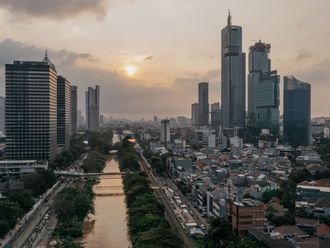Muscat: Work came to a complete halt on Wednesday morning at Oman's Rusayl Industrial Estate, 45km north of the capital Muscat, as about 1,000 Omani workers stopped work and later turned violent.
The workers blocked the entry and exit points to the industrial estate, set up in 1982 and the first in Oman. It has more than 150 manufacturing units and work at almost all of them was hampered, with the strikers moving from unit to unit and forcing the stoppage of work.
Attempts by a drinking water company to take its delivery vehicle out met with an aggressive response from the striking workers who snatched all bottles out of the truck and didn't allow it to leave. They were also seen snatching away the keys of other commercial vehicles inside the industrial estate's premises to prevent them moving.
The protesting workers, from different units of the industrial estate, are demanding a minimum wage of 300 Omani riyals, five-day working weeks and Eid holidays on par with the government sector.
All the while that the strike and demonstrations were going on, police and army personnel watched with restraint and patience, and refrained from interfering.
The workers later held a meeting with Minister of Manpower Abdullah Bin Nasser Bin Abdullah Al Bakri. However, their use of force to drive home their point is not expected to go down well with the authorities as only on Tuesday night the Council of Ministers had issued a mild warning against protest actions that violate the country's laws.
Meanwhile, in an apparent domino effect of protests and strikes, security personnel from Oman's Security and Safety Services (SSS) blocked the main Sultan Qaboos Highway opposite the Muscat International Airport in a protest of their own and, according to unconfirmed reports, roughed up a few motorists as traffic piled up for several kilometres.
The SSS is an arm of the Royal Oman Police Pension Fund and handles security arrangements outside establishments such as banks and ministries. High ranking officials reached the spot and convinced the striking security officials to ease traffic flow on the main road of Muscat.
Traffic to Muscat airport was unaffected, but the striking workers disrupted traffic in the Seeb area and reportedly damaged some vehicles in their agitated mood.
There have also been reports of protest from places such as Faud, Marmul, Ibal and others where Oman's oil installations are. In some cases, employees of sub-contractors working for Petroleum Development Oman (PDO), and PDO employees themselves, have refused to work.
"While oil production is not affected, project work has been severely hampered in these areas, as Omani drivers are refusing to ferry staff from their accommodations to the project sites located far enough away in the desert to reach on foot," an employee in a desert location in south Oman told Gulf News on condition of anonymity.
Although the Port Services Corporation has increased the basic salaries of its workers by 7.5 to 20 per cent, and raised the annual allowance, port workers continued to protest on Wednesday, bringing all port activities to a halt.
At Sohar, the Globe Roundabout remained closed for traffic although the number of protesters in the morning was not more than 30. According to a Sohar resident, the students of Sohar College barred entry to expatriate teaching staff as they went on strike, asking lower passing grades, more allowance and other demands.
Also, in the midst of Omanis demonstrating for their demands, over 100 Bahrainis living in the country staged a sit-in outside the Bahrain Embassy in Muscat.











